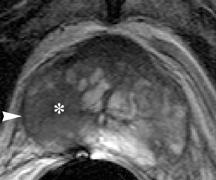
November 12, 2010 – A noninvasive imaging technique may help effectively diagnose prostate cancer at an early stage without ionizing radiation. According to a report at the Advances in Contrast Ultrasound – ICUS Bubble Conference, contrast-enhanced ultrasound (CEUS) could help diagnose the most common cancer afflicting American men. "CEUS represents an important opportunity for early detection and for guiding local therapy," said Massimo Mischi of Eindhoven University of Technology in the Netherlands. His work was funded by the Dutch government. Men with elevated levels of prostate specific antigen (PSA) are considered at risk of having prostate cancer, and are typically referred for diagnostic biopsies. But PSA levels may be elevated in many men who do not have prostate cancer and most biopsies are unnecessary, Mischi said. "We know that as many as 76 percent of biopsies were in retrospect unnecessary," he said. "Effective diagnostic imaging is essential because localized therapies can be effective." In CEUS imaging, patients are injected with a special contrast agent that does not contain dye and does not require ionizing radiation. It is approved by the U.S. Food and Drug Administration (FDA) for certain types of cardiac imaging and is approved in Europe, Canada, Asia and South America for pinpointing disease and tumors in other parts of the body. "CEUS can offer a safe and cost effective means of improving the accuracy of ultrasound diagnoses," said Steven Feinstein, M.D., director of echocardiography at Rush University Medical Center in Chicago, director of the conference and co-president of the International Contrast Ultrasound Society. For more information: www.icus-society.org


 March 19, 2025
March 19, 2025 








